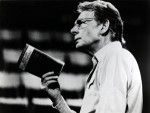Column Name
Title
Michael Langham, a former director of the Stratford Shakespeare Festival in Canada, the Guthrie Theater in Minneapolis, and Juilliard’s Drama Division, died on January 15 at his home in Cranbrook, Kent, England, after a short illness. He was 91.
Body
“Michael was a person of impeccable taste representing the highest standards of the profession,” President Joseph W. Polisi said. “His direction of the plays of Shakespeare, in particular, was always a highlight of the Juilliard season. He brought sincerity to his approach to the education of actors that was appreciated by the many students who worked with him at the School.”
Born in Bridgewater, England, on August 22, 1919, Langham studied drama at Radley College a secondary school near Oxford, and then law at the University of London before enlisting in the British Army in 1939. He was soon captured by the Germans and spent five years as a prisoner of war. In a 1992 Juilliard Journal article, Drama Division faculty member Richard Feldman quoted Langham as saying that when he was first in the prison camp, he devoted all his energy to trying to escape, “but it soon became apparent that digging tunnels and dying clothes were not the most productive way to spend my time.” Langham turned to his hobby, the theater, and started directing fellow prisoners in plays. The first production was Thunder Rock, “a play about people who think there is no way out of their situation and are proved wrong. Two men I know of went back on their decision to commit suicide after seeing the play. It was that production and its impact on these men and all the men that made me decide to devote my life to the theater,” Langham said.
After the war he led several British theater companies in Birmingham, Coventry, and Glasgow before coming to Canada at the request of Tyrone Guthrie, the founding artistic director of the Stratford Shakespeare Festival. Most of Langham’s subsequent career was spent in the United States and Canada. He took over the artistic directorship of Stratford Shakespeare from Guthrie in 1956, remaining in that post until 1967. He was also the artistic director of the Guthrie Theater in Minneapolis (also founded by Tyrone Guthrie) from 1971 to 1977, and of La Jolla Playhouse in California. He returned frequently to Stratford to direct many acclaimed productions, including Love’s Labour’s Lost, which became something of a signature production for him. Over the years he mounted many successful productions at London’s Old Vic and on and off Broadway, including Much Ado About Nothing at the Biltmore, The Prime of Miss Jean Brodie at the Helen Hayes, and Julius Caesar for the New York Shakespeare Festival at the Public Theater.
Langham served as director of Juilliard’s Drama Division from 1979 to 1992. Among his many accomplishments at Juilliard was bringing Tony Kushner’s Pulitzer Prize-winning two-part play, Angels in America, to Juilliard for development. Part one, Millennium Approaches, received its New York premiere here by fourth-year drama students in April 1992 prior to moving to Broadway.
The School bestowed an honorary Doctor of Fine Arts on Langham in 1992, and he returned in 2005 for Juilliard’s 100th commencement, at which he was among 17 former honorary doctorate recipients to be awarded the Juilliard Medal.
Langham was married to actress Helen Burns, who survives him. Also surviving are a half sister; a son, Christopher; daughter-in-law, Christine; and five grandchildren.
When Langham retired from Juilliard, one of his students, Alex Phoenix (Group 21), wrote these words of tribute for The Juilliard Journal: "A Shakespearean Text class with Michael is an experience to behold. The students huddle into his office, texts open and, and Michael sits hunched over his desk. With an expression one might mistake for a scowl, he listens meticulously to a student bashing out a bit of text. Suddenly he looks up, gives a technical correction ... Soon Michael himself is speaking the text with such passion and acumen that the listener feels oneself in the presence of a master decoding and bringing an ancient text to life with a real modern resonance. It is then that one can really apprehend the incredible gift that is Shakespeare, for contemporary society.”





